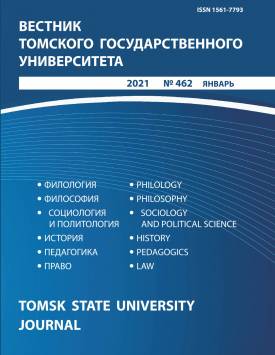Philosophical Origins of the Organic Theory of Salvation in Orthodox Theology
The historical study of modern Orthodox theology is a very important process, which is only now finding its place in science. Orthodox dogmatic theology can only seem static, while a closer examination can reveal the processes of decomposition, change and mutation. This article analyzes the theological history of the organic atonement theory, with Vladimir Lossky as its main advocate. The appearance of several atonement theories in theology (along with the criticism of legal theory - a traditional theory peculiar to academic education) highlights the reasons leading to such an unusual state of affairs. In the author's opinion, this situation is one of the indicators for the changes in theology under the influence of new philosophical trends. The links between the organic atonement theory and philosophical research were noticed as early as in the 20th century. However, the issue has been still insufficiently explored. In connection with this, one of the objectives in this article is a thorough consideration of the way the Russian religious thought participated in the development of the 20th-century Orthodox theology. The largest school of religious philosophy at the beginning of the 20th century was the philosophy of unitotality, which was supported by many famous authors, including theologicians Sergei Bulgakov, Lev Karsavin, Sergei and Evgenii Trubetskoy, Vladimir Ern, Pavel Florensky, et al. The Russian philosopher Vladimir Solovyov was the initiator of this movement. The thinkers mentioned above and the authors of “organic” theology (in particular, Lossky and Georges Florovsky) are linked not only by their biographies, but also by common themes, methodological guidelines and objects of criticism. Thus, one of the key features of the “organic” atonement theory is the idea that Jesus Christ adopted the common human nature, and it exists as real and integrated in every single human hypostasis. In the author's opinion, this viewpoint is not specific to Russian Orthodox theology before the 20th century. It was indeed inspired by the philosophy contemporary to Lossky. We can find the same ideas in the works by Karsavin and archpriest Bulgakov, whose teachings influenced Lossky's views. At the same time, Lossky tried to dissociate himself from philosophy and remain a theologician. However, the author undertakes to demonstrate that not all of his resources are in the patristic tradition. In this regard, we cannot speak about imitation. On the contrary, we discuss the unconscious adoption of some topics, images and methodological techniques by Lossky from his opponents and teachers.
Keywords
Organic Atonement Theory, Vladimir Lossky, philosophy of all-unity, theology, history of philosophy, soteriologyAuthors
| Name | Organization | |
| Sizov Sergey E. | Tomsk State University | sseezov@mail.ru |
References

Philosophical Origins of the Organic Theory of Salvation in Orthodox Theology | Vestnik Tomskogo gosudarstvennogo universiteta – Tomsk State University Journal. 2021. № 462. DOI: 10.17223/15617793/462/10
